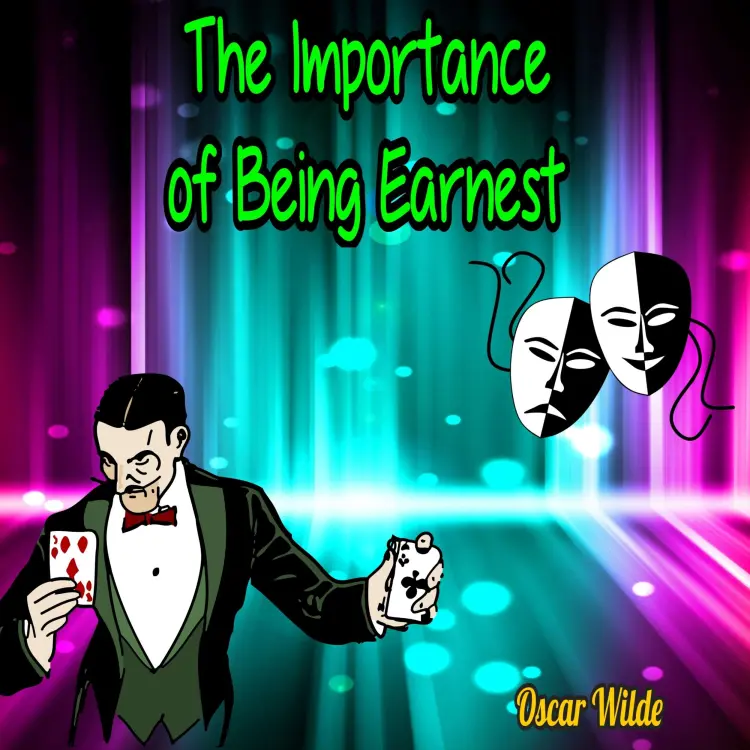
The Importance of Being Earnest - A Trivial Comedy for Serious People
Oscar Wilde
Unabridged
2 hours 10 minutes
Note: Costs may be incurred for playing the audio books or audio plays on the respective platforms, e.g. Spotify. Lismio has no influence on which audiobooks and audio plays are available on the service.
Some articles contain affiliate links (marked with an asterisk *). If you click on these links and purchase products, we will receive a small commission at no extra cost to you. Your support helps to keep this site running and to continue creating useful content. Thank you for your support!
From the publisher
The Importance of Being Earnest, A Trivial Comedy for Serious People is a play by Oscar Wilde. First performed on 14 February 1895 at the St James's Theatre in London, it is a farcical comedy in which the protagonists maintain fictitious personae to escape burdensome social obligations. Working within the social conventions of late Victorian London, the play's major themes are the triviality with which it treats institutions as serious as marriage, and the resulting satire of Victorian ways. Some contemporary reviews praised the play's humour and the culmination of Wilde's artistic career, while others were cautious about its lack of social messages. Its high farce and witty dialogue have helped make The Importance of Being Earnest Wilde's most enduringly popular play.
Synopsis:
The play opens with Algernon Moncrieff, an idle young gentleman, receiving his best friend, Jack Worthing ("Ernest"). Ernest has come from the country to propose to Algernon's cousin, Gwendolen Fairfax. Algernon refuses to consent until Ernest explains why his cigarette case bears the inscription, "From little Cecily, with her fondest love to her dear Uncle Jack." 'Ernest' is forced to admit to living a double life. In the country, he assumes a serious attitude for the benefit of his young ward, the heiress Cecily Cardew, and goes by the name of Jack, while pretending that he must worry about a wastrel younger brother named Ernest in London.
In the city, meanwhile, he assumes the identity of the libertine Ernest. Algernon confesses a similar deception: he pretends to have an invalid friend named Bunbury in the country, whom he can "visit" whenever he wishes to avoid an unwelcome social obligation. Jack refuses to tell Algernon the location of his country estate.
Gwendolen and her formidable mother Lady Bracknell now call on Algernon who distracts Lady Bracknell in another room while Jack proposes to Gwendolen. She accepts, but seems to love him in large part because of his name, Ernest.
Jack accordingly resolves to himself to be rechristened "Ernest". Discovering them in this intimate exchange, Lady Bracknell interviews Jack as a prospective suitor. Horrified to learn that he was adopted after being discovered as a baby in a handbag at Victoria Station, she refuses him and forbids further contact with her daughter. Gwendolen manages to covertly promise to him her undying love. As Jack gives her his address in the country, Algernon surreptitiously notes it on the cuff of his sleeve: Jack's revelation of his pretty and wealthy young ward has motivated his friend to meet her.
Synopsis:
The play opens with Algernon Moncrieff, an idle young gentleman, receiving his best friend, Jack Worthing ("Ernest"). Ernest has come from the country to propose to Algernon's cousin, Gwendolen Fairfax. Algernon refuses to consent until Ernest explains why his cigarette case bears the inscription, "From little Cecily, with her fondest love to her dear Uncle Jack." 'Ernest' is forced to admit to living a double life. In the country, he assumes a serious attitude for the benefit of his young ward, the heiress Cecily Cardew, and goes by the name of Jack, while pretending that he must worry about a wastrel younger brother named Ernest in London.
In the city, meanwhile, he assumes the identity of the libertine Ernest. Algernon confesses a similar deception: he pretends to have an invalid friend named Bunbury in the country, whom he can "visit" whenever he wishes to avoid an unwelcome social obligation. Jack refuses to tell Algernon the location of his country estate.
Gwendolen and her formidable mother Lady Bracknell now call on Algernon who distracts Lady Bracknell in another room while Jack proposes to Gwendolen. She accepts, but seems to love him in large part because of his name, Ernest.
Jack accordingly resolves to himself to be rechristened "Ernest". Discovering them in this intimate exchange, Lady Bracknell interviews Jack as a prospective suitor. Horrified to learn that he was adopted after being discovered as a baby in a handbag at Victoria Station, she refuses him and forbids further contact with her daughter. Gwendolen manages to covertly promise to him her undying love. As Jack gives her his address in the country, Algernon surreptitiously notes it on the cuff of his sleeve: Jack's revelation of his pretty and wealthy young ward has motivated his friend to meet her.
















